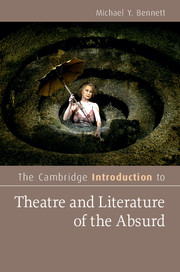Book contents
- Frontmatter
- Dedication
- Contents
- Acknowledgments
- Chapter 1 Introduction: Overview of the absurd
- Chapter 2 Setting the stage
- Chapter 3 The emergence of a “movement”: The historical and intellectual contexts
- Chapter 4 Samuel Beckett
- Chapter 5 Beckett's notable contemporaries
- Chapter 6 The European and American wave of absurdism
- Chapter 7 Post-absurdism?
- Chapter 8 Absurd criticism
- Notes
- Further reading
- Index
- Cambridge Introductions to …
Chapter 7 - Post-absurdism?
Published online by Cambridge University Press: 05 November 2015
- Frontmatter
- Dedication
- Contents
- Acknowledgments
- Chapter 1 Introduction: Overview of the absurd
- Chapter 2 Setting the stage
- Chapter 3 The emergence of a “movement”: The historical and intellectual contexts
- Chapter 4 Samuel Beckett
- Chapter 5 Beckett's notable contemporaries
- Chapter 6 The European and American wave of absurdism
- Chapter 7 Post-absurdism?
- Chapter 8 Absurd criticism
- Notes
- Further reading
- Index
- Cambridge Introductions to …
Summary
Is there such a thing as post-absurdism? While clearly absurdism is not the dominant “genre” of the theatre (or fiction) anymore (as it was for a while in the 1950s and 1960s, especially), would it be more accurate to say that the arts have (1) moved past the absurd? or (2) incorporated the absurd? There is an argument to be made for both of these assertions.
The influence of the absurdist “movement”
As I quoted Enoch Brater at the end of the Introduction, his words are worth repeating: the absurd “is all around.” In part, because the influence of the absurd is so great, it is very difficult to truly or accurately measure it. And while some lines of influence are still very direct, as many contemporary writers look to Beckett, Pinter, and Albee as their major and/or primary influences, the absurd's web of influence is seemingly immeasurable (and if we add Kafka, Dadaism, Surrealism, and Joyce to this list, as they influenced Beckett, Pinter, and Albee in one way or another, the web of influence absolutely does become immeasurable). Yes, it is easy to see how tightly wound a web is near its center, but the further one moves away from a web, the gaps between the web's strands widen, and the outside of a web is almost invisible to the naked eye. And such is the influence of the absurd and the height of its expression in the 1950s, 1960s, and 1970s.
It can be suggested, then, that this literary avant-garde, which was experimental at its inception, in some ways made experimenting with form, language, and content – even made avant-garde writing – acceptable and more approachable to general readers and theatregoers. And whether we argue that absurd literature had modernist and/or postmodernist leanings, it is quite clear that before the absurd, the leading literature of the day was modernist, and postmodern literature, which generally does experiment with form, language, and content, began to flourish right after the incorporation/assimilation/and so on of absurd literature into mainstream literary techniques. Especially with Beckett's novels, and particularly his Trilogy, we see the transition from the modernist tome in Joyce's Ulysses to the grumblings of postmodern (especially) fiction.
- Type
- Chapter
- Information
- Publisher: Cambridge University PressPrint publication year: 2015



